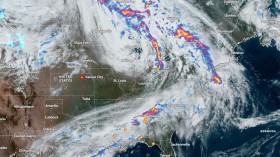It took early humans years to master the art of cooking and realize that fire can make things taste better. And while our close relatives, chimpanzees, won't be making that cognitive leap anytime soon or ever, new research shows that they would make excellent cooks.
While it's long been known that chimps prefer cooked food when given the option, a new study published in the journal Proceedings of the Royal Society B goes even further, showing how chimps may have the patience, planning ability and understanding needed to do the cooking themselves if given the chance.
"It is an important question when cooking emerged in human evolution," developmental psychologist Felix Warneken of Harvard University, who conducted the study with Alexandra Rosati, said in a statement.
"We thought one way to get at this question is to investigate whether chimpanzees, in principle, have the critical cognitive capacities for cooking. If our closest evolutionary relative possesses these skills, it suggests that once early humans were able to use and control fire they could also use it for cooking."
In the study, researchers conducted a series of experiments on wild chimps at the Tchimpounga Sanctuary in the Republic of Congo. They wanted to see if chimps could make the mental leaps necessary for cooking.
They created a "cooking device," which was really just a bowl with a false bottom and a cooked potato slice inside. But as far as the chimps knew, a raw potato would become cooked after a short wait. Meanwhile, a control device was used that left the cooked potato slice unchanged, without the wait.
However, even when presented with both, nearly every chimp picked the cooking device, suggesting that these animals actually understood that their food was being cooked.
"The first time one of the chimps did this, I was just amazed," Rosati said. "I really had not anticipated it. When one of them did it, we thought maybe this one chimp is just a genius, but eventually about half of them did it."
And in some cases, the chimps were not only willing to delay the gratification of eating to get a cooked potato instead of a raw one, but they were even willing to carry the potato over a short distance to be cooked.
However, the food did not always make it to the cooker.
"They'd often try to carry it with their mouth, because chimpanzees are knuckle walkers, and you'd almost see them accidentally eat the food on their way over, almost like 'oops' they couldn't even resist, because they were carrying the food in their mouth," Rosati told Scientific American.
However, half of the chimps were able to resist eating multiple potatoes, with some saving up to 28 potato slices to be cooked later.
These findings don't mean we'll be seeing chimp chefs anytime soon, but they do help shed light on the possible cooking abilities of our early human ancestors.
"We can't date the control of fire with cognition studies, but we can start to date these other skills that come into play for cooking," Rosati said. "This type of comparative psychological evidence can tell us a great deal about our evolutionary past. I think it supports the idea that cooking emerged early in human evolution, because it suggests all the cognitive pieces were there. All we needed was control of fire."
For more great nature science stories and general news, please visit our sister site, Headlines and Global News (HNGN).
© 2024 NatureWorldNews.com All rights reserved. Do not reproduce without permission.





